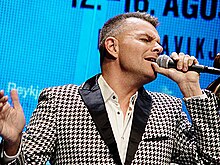Iceland in the Eurovision Song Contest 1997
| Eurovision Song Contest 1997 | ||||
|---|---|---|---|---|
| Country | ||||
| National selection | ||||
| Selection process | Internal selection | |||
| Selection date(s) | Artist: 27 February 1997 Song: 11 March 1997 | |||
| Selected entrant | Paul Oscar | |||
| Selected song | "Minn hinsti dans" | |||
| Selected songwriter(s) |
| |||
| Finals performance | ||||
| Final result | 20th, 18 points | |||
| Iceland in the Eurovision Song Contest | ||||
| ||||
Iceland participated in the Eurovision Song Contest 1997 with the song "Minn hinsti dans" written by Trausti Haraldsson and Páll Óskar Hjálmtýsson. The song was performed by Paul Oscar, which is the artistic name of Hjálmtýsson who was internally selected by the Icelandic broadcaster Ríkisútvarpið (RÚV) in February 1997 to represent Iceland at the 1997 contest in Dublin, Ireland. The Icelandic song, "Minn hinsti dans", was presented to the public on 11 March 1997.
Iceland competed in the Eurovision Song Contest which took place on 29 May 1997. Iceland was the closing performance of the show in position 25 and the nation placed twentieth out of the 25 participating countries, scoring 18 points.
Background[edit]
Prior to the 1997 contest, Iceland had participated in the Eurovision Song Contest eleven times since its first entry in 1986.[1] Iceland's best placing in the contest to this point was second, which it achieved in 1990 with the song "Eitt lag enn" performed by Stjórnin. In 1996, Iceland placed thirteenth with the song "Sjúbídú" performed by Anna Mjöll.
The Icelandic national broadcaster, Ríkisútvarpið (RÚV), broadcasts the event within Iceland and organises the selection process for the nation's entry. Since 1995, Iceland has internally selected their entry for the Eurovision Song Contest, a method that continued for their 1997 participation.[2]
Before Eurovision[edit]
Internal selection[edit]

The Icelandic entry for the Eurovision Song Contest 1997 was selected internally by RÚV.[2] On 27 February 1997, Páll Óskar Hjálmtýsson (under the stage name Paul Oscar) was announced as the Icelandic representative. It was also announced that the song he would perform, which was described as "extraordinarily unusual for Eurovision", was composed by Trausti Haraldsson and Paul Oscar who also wrote the lyrics himself.[3][4] In regards to his selection as the Icelandic entrant, Paul Oscar stated: "I intend to grab the most attention from viewers and entertain myself royally... It's no problem to put on a show for 500 million people. I feel better as the millions increase."[5] The song, "Minn hinsti dans", was presented to the public on 11 March 1997 on Rás 2, while its music video was presented on 21 March 1997 during the television programme Dagsljós.[3][6][7]
At Eurovision[edit]
According to Eurovision rules, the twenty-four countries which had obtained the highest average number of points over the last four contests competed in the final on 3 May 1997.[8] On 28 November 1996, an allocation draw was held which determined the running order and Iceland was set to perform last in position 25, following the entry from the United Kingdom.[9] Heading into the final of the contest, Iceland was considered by bookmakers to be the twentieth most likely country to win the competition.[10]
The Icelandic performance featured Paul Oscar surrounded by four female dancers (Guðrún Kaldal, Helena Jónsdóttir, Hlíf Þorgeirsdóttir and Ingibjörg Agnes Jónsdóttir) performing an erotic routine in latex outfits.[11][12] The Icelandic conductor was Szymon Kuran and Iceland finished in twentieth place with 18 points, 16 of them which came from three of the five participating countries that used televoting for the first time to determine their points – Austria, Sweden and the United Kingdom.[13][14]
The contest was broadcast in Iceland on RÚV with commentary by Jakob Frímann Magnússon.[15] The Icelandic spokesperson, who announced the Icelandic votes, was Svanhildur Konráðsdóttir.
Voting[edit]
Below is a breakdown of points awarded to Iceland and awarded by Iceland in the contest. The nation awarded its 12 points to Cyprus in the contest.
|
|
References[edit]
- ^ "Iceland Country Profile". EBU. Retrieved 3 October 2014.
- ^ a b "Valinn keppandi fer í Eurovision". Dagur-Tíminn (in Icelandic). 10 January 1997. p. 2. Retrieved 5 May 2024.
- ^ a b "Páll Óskar verður fulltrúi Íslands á Eurovision í Dyflinni". Morgunblaðið (in Icelandic). 27 February 1997. p. 6. Retrieved 5 May 2024.
- ^ "Eurovision 1997 Iceland: Paul Oscar - "Minn Hinsti Dans"". Eurovisionworld. Retrieved 5 May 2024.
- ^ "Ætla að vekja mesta athygli". Morgunblaðið (in Icelandic). 28 February 1997. p. 32. Retrieved 5 May 2024.
- ^ "Lofa því að þetta verður töff". Dagur (in Icelandic). 14 March 1997. p. 6. Retrieved 5 May 2024.
- ^ "Svanasöngur með hröðum en tregafullum takti". Morgunblaðið (in Icelandic). 21 March 1997. p. 6. Retrieved 5 May 2024.
- ^ "Rules of the Eurovision Song Contest (Part 1)". Radió Telefís Éireann. Archived from the original on 2 February 1999. Retrieved 29 June 2022.
- ^ "Rules of the Eurovision Song Contest (Part 1)". Radió Telefís Éireann. Archived from the original on 2 February 1999. Retrieved 29 June 2022.
- ^ "What are the Odds?". Radio Telefís Éireann. Archived from the original on 24 February 1999. Retrieved 20 November 2022.
- ^ "Paul Oscar | The King of Icelandic Pop Music". Guide to Iceland. Retrieved 5 May 2024.
- ^ "Paul Oscar". Eurovision Universe. Retrieved 5 May 2024.
- ^ "Final of Dublin 1997". European Broadcasting Union. Archived from the original on 14 April 2021. Retrieved 14 April 2021.
- ^ ESC History - Iceland 1997
- ^ "Dagskrá laugurdags 3. maí" [Schedule for Saturday 3 May]. Dagblaðið Vísir – DV (in Icelandic). 3 May 1997. p. 62. Retrieved 26 June 2022 – via Timarit.is.
- ^ a b "Results of the Final of Dublin 1997". European Broadcasting Union. Archived from the original on 14 April 2021. Retrieved 14 April 2021.
